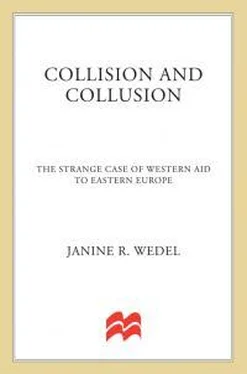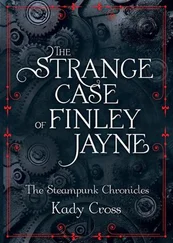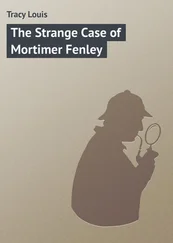An associate of Sachs’s and another ubiquitous transactor was Anders Åslund, the former Swedish envoy to Russia. Åslund was connected to Chubais and the Clan even before the dacha days. Based in Washington, he worked with Sachs and Yegor Gaidar. Like the grants Sachs secured, those that Åslund received from several sources were substantial.163 He played a key role in promoting the Chubais group. Åslund appeared to represent and to speak on behalf of American, Russian, and Swedish governments and authorities. He was seen by some Russian officials in Washington as Chubais’s personal envoy, and is known to have played a role in Swedish aid and policy toward Russia, as stated earlier. (For example, Åslund was highly influential with Sweden’s Prime Minister Carl Bildt, who promoted him in Washington and included him in a high-level official delegation to the White House.164) Although a private citizen of Sweden, he participated in high-level, closed meetings shaping U.S. and IMF policies toward Russia in the Departments of Treasury, State, and USAID.165
Åslund was also involved in brokering business activities in Russia.166 He had “significant” business investments there, according to Vyacheslav Razinkin, head of the Interior Ministry’s Department of Organized Crime.167 In addition to (or perhaps as part of) his work for the Chubais Clan, governments and business, Åslund was paid to do public relations. His assignment in Ukraine, where he also was active and funded by George Soros’s Open Societies Institute, explicitly included public relations on behalf of Ukraine, according to Soros-funded advisers who worked with Åslund in Russia and Ukraine.168 Åslund’s effectiveness in this role no doubt was enhanced by his affiliation with Washington think tanks, his frequent contributions on Russia and Ukraine to publications such as the Washington Post and the London Financial Times, and the fact that he was invariably presented as an objective analyst, despite the promotional roles he additionally played.169
Clearly, the most effective transactors are the ones most skilled at exploiting fragmentation and amorphous structure: flex organizations, bureaucracy, and governments. The transactors have multiple roles and identities at their disposal and are adept at working them.
ORCHESTRATED MUSICAL CHAIRS
The Chubais-Harvard transactors’ near monopoly on aid in support of market reform, which they often realized through decree and “private” organizations used as political machines, made it easy for their representatives to actively pursue their own interests and to work on all sides of the table both in Russia and with the donors. The transactors worked through the donor community to influence aid policies toward Russia, to direct the allocation of technical assistance grants, and then to manage the monies themselves. Chubais signed letters requesting foreign aid while he and his associates were also the recipients of the aid.
With the backing of the United States, other donor nations, and the international financial institutions, the Chubais Clan and the Harvard Institute group were loyal and mutually dependent. Each was the other one’s entree. The Clan was Harvard’s avenue to Russia, key to its ability to claim clout and contacts with the Russian government. In turn, Harvard was the Clan’s channel to U.S. policymakers and aid dollars, although members of the Chubais group learned to cultivate their own contacts and subsequently often spoke on their own. Jonathan Hay often spoke on behalf of Maxim Boycko, Dmitry Vasiliev, and other Chubais Clan members.170
In lobbying for aid contracts, the Harvard Institute group continually cited its access to Russian “reformers” as its primary comparative advantage as advisers; this access was a key part of the Harvard group’s public relations efforts. Lobbying was very effective because the structure of authority was, in many ways, ad hoc and allowed to be so, because USAID’s management practices were often fragmented and ambiguous. If a member of the partnership failed to get a “yes” in one place, he often went up the ladder (or around it) until a “yes” was provided. When he did not get a hearing to his satisfaction or was turned down by lower or local USAID authorities, he had the option of going directly to higher authorities, often the U.S. Department of State’s coordinator of NIS assistance, Richard L. Morningstar. Jonathan Hay, Maxim Boycko, Dmitry Vasiliev, and Ruslan Orekhov all made trips to Washington to talk to Morningstar and/or lobbied him directly when they were stymied somewhere down the chain. Some officials high in the chain of command in the U.S. executive branch strongly endorsed Harvard’s role in Russia.
The Chubais Clan and Harvard were not only loyal to each other, but with the backing of U.S. officials, they also employed loyalty as a key strategy for success. In the United States, the Harvard transactors touted Chubais as the voice of Russia, and he became the quintessential enlightened Russian in the eyes of many U.S. officials and commentators. After Chubais was dismissed by Yeltsin as first deputy prime minister in January 1996, he was placed on the Harvard Institute payroll, a demonstration of solidarity for which senior U.S. officials openly declared their support.171 In response to the question “Why was Chubais put on the USAID-HIID payroll?,” USAID’s Dine replied that “the Harvard people said that they could use him as a consultant to them.”172
Similarly, when Stanford University, not Harvard, was awarded a contract to work with the Clan-run Russian Federal Commission on Securities and the Capital Market, Vasiliev turned down Stanford’s help. Harvard Institute director Shleifer explained that Vasiliev “had a group of people he was working with. The people at Stanford were on record [as] being extremely hostile to privatization.… He didn’t want to work with them.” Also, because Vasiliev was getting a loan from the World Bank, Shleifer remarked, the “AID loan doesn’t matter as much.”173 The Clan managed to wring additional funds out of USAID for the same project that Stanford was to have worked on, now with Harvard as the partner. In September 1995, the Russian Federal Commission and the Harvard Institute received $1.7 million as an amendment to the 1992 cooperative agreement.
The Chubais-Harvard transactors arranged for themselves and their associates to be well represented on the high-level Gore-Chernomyrdin Commission, which helped to facilitate cooperation on U.S.-Russian oil deals and the Mir Space Station. The Commission’s Capital Markets Forum was chaired on the Russian side by Chubais and Vasiliev and on the American side by the SEC’s Arthur Levitt Jr. and Treasury Secretary Robert Rubin, a former board member of the Harvard Management Company (HMC), which oversees Harvard University’s investments. In a speech at Harvard in January 1997, Deputy Treasury Secretary Lawrence Summers said that “assisting Russia in the development of its capital markets is a top priority of the Treasury Department” and that the forum’s four working groups drew on “some of the best talent that the United States has to offer.”174 In an April 1997 speech before the U.S.-Russia Business Council, Summers reiterated that the U.S.-Russia Capital Markets Forum “has enlisted the participation of the best experts the U.S. can offer.”175
Andrei Shleifer was named special coordinator of the Capital Markets Forum’s working groups, the only representative to all four working groups: Investor Protection; Capital Markets Infrastructure; Collective Investment Vehicles; and Taxation, Accounting, and Auditing. Elizabeth Hebert, Hay’s girlfriend and head of Pallada, also served on two of the forum’s working groups, along with CEOs from Salomon Brothers, Merrill Lynch, and other powerful American-based investment houses. When a U.S. Treasury spokesman was asked who named Shleifer and Hebert to the forum, the answer was that they were appointed by the Chubais group—specifically, according to other sources, by Dmitry Vasiliev.176 In fall 1997, Congress asked the GAO to look into Shleifer’s role in the Gore-Chernomyrdin Commission. The U.S. Department of Justice, with concurrence from the U.S. House of Representatives’ International Relations Committee, requested that GAO suspend its probe, pending the outcome of Justice’s investigation.
Читать дальше












